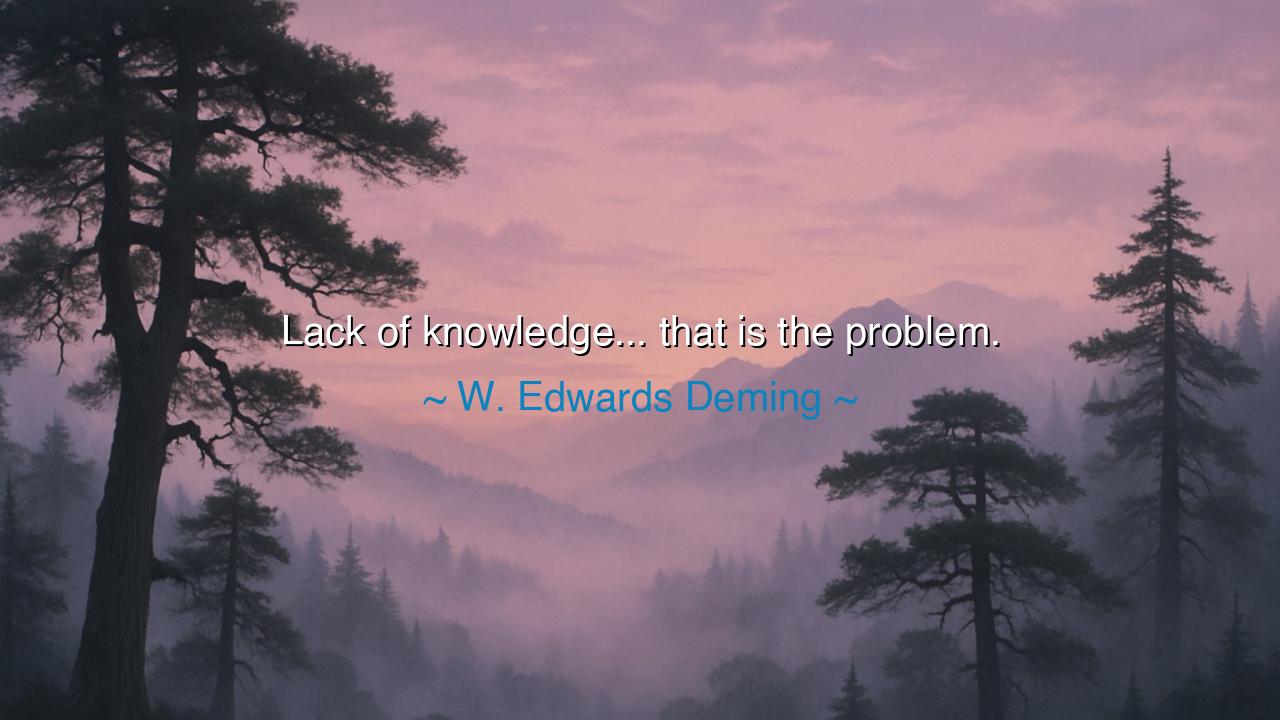
Lack of knowledge... that is the problem.






The wise reformer of industry, W. Edwards Deming, once declared: “Lack of knowledge… that is the problem.” His words, though simple, strike like a bell that awakens sleeping generations. For he does not say that fate is the enemy, nor circumstance, nor even misfortune itself. He points instead to ignorance—the absence of knowledge—as the root of so much suffering, error, and wasted labor. Where the light of understanding is dim, men stumble; where it shines bright, men walk in strength and purpose.
Consider how nations rise or fall by this truth. A people rich in resources but poor in knowledge will squander their wealth, for they do not know how to shape it. But a people with little land and meager stores, yet filled with wisdom and learning, may build wonders and endure for centuries. Knowledge is the seed of progress, the shield against ruin, the foundation upon which both justice and prosperity are raised. Without it, effort is scattered like dust in the wind.
We see this written clearly in the story of Japan after the Second World War. The nation lay in ashes, its cities shattered, its industries destroyed. Yet Deming himself entered that land and taught the leaders not to chase after quick gain, but to pursue knowledge—of quality, of systems, of improvement. They listened, they studied, they learned. In a single generation, Japan rose from ruin to become a beacon of precision, discipline, and prosperity. The problem had not been lack of will, nor lack of resources—it had been lack of knowledge. Once corrected, greatness followed.
So too, the ancients tell us of Socrates, who walked the streets of Athens declaring that the beginning of wisdom was to know one’s own ignorance. He taught that men fall into folly not because they lack strength or desire, but because they think they know when they do not. His teaching, like Deming’s, points to the same fountain: if you would solve the problems of life, you must first conquer ignorance and pursue true understanding.
What, then, is the lesson for you, traveler upon life’s road? It is this: do not blame the world, nor curse fortune, until you have asked yourself—What do I not yet know? For in many struggles, the enemy is not destiny but blindness. When the harvest fails, ask whether you know the soil. When your work falters, ask whether you know the method. When conflict burns, ask whether you know the hearts of men. Most obstacles yield when met with greater knowledge, while those who refuse to learn remain chained to their failures.
Therefore, practice daily the art of learning. Read widely, listen deeply, observe closely. Do not be ashamed to ask questions, nor proud to admit ignorance. Seek out teachers in every walk of life, for wisdom hides in the craftsman as much as in the sage. And above all, be humble, for humility is the doorway to knowledge, while pride bars the way.
Remember this eternal truth: wars are lost, empires collapse, families break, and souls are wounded—most often not from malice, but from lack of knowledge. Yet those who pursue learning with patience become healers of division, builders of peace, and creators of abundance. To learn is to arm yourself with light; to refuse to learn is to walk willingly into darkness.
So let Deming’s words be your guide: when you face a problem, do not ask first for more power, or more wealth, or more tools. Ask instead for knowledge. For when you gain understanding, the path opens, the burden lightens, and the impossible becomes possible.






AAdministratorAdministrator
Welcome, honored guests. Please leave a comment, we will respond soon